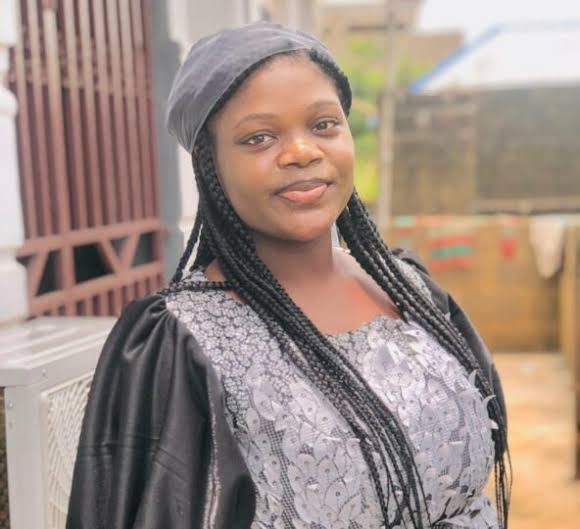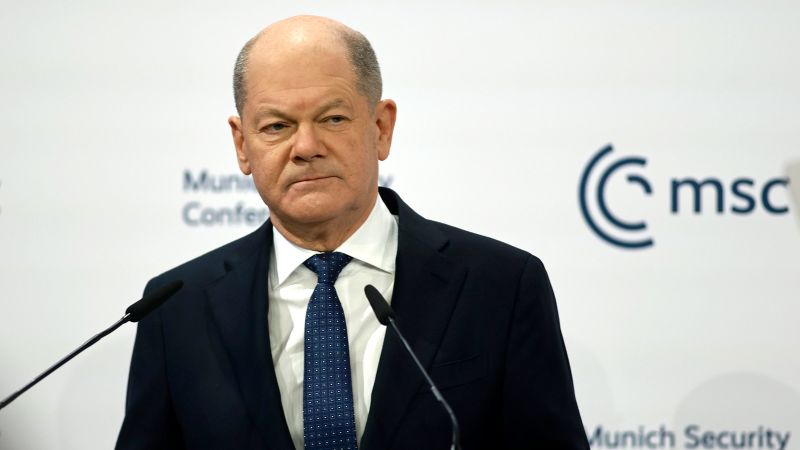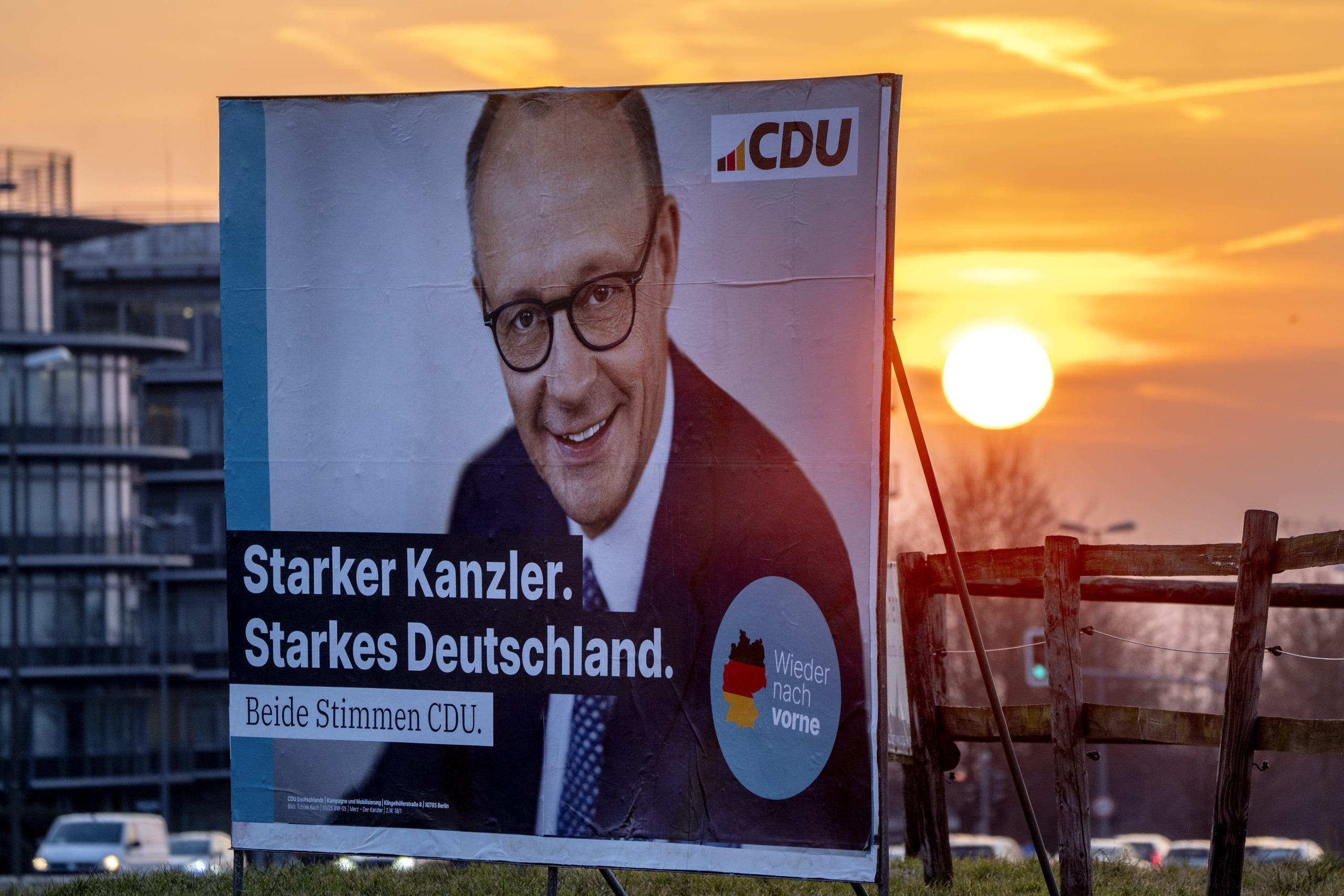German election: Top candidates face public town hall - DW - 02/17/2025
February 17, 2025
Next up was Chancellor Olaf Scholz of the SPD. Having greeted Merz with a handshake the two agreed that they would not be working in the same administration after February 23 — one possible coalition envisioned by analysts would be a so-called Grand Coalition between the CDU and SPD.
Scholz fielded questions about retirement funds as well as healthcare and the problem of training, payment and understaffing.
An Afghan questioner made an emotional plea for more opportunities — such as stipends for specialized training — for foreigners who want to live their lives in Germany, especially in the healthcare sector.
After trips to Paris to confer with allies about the war in Ukraine after the Munich Security Conference, Scholz was asked how he planned to maintain good relations with the US.
The chancellor acknowledged the historical importance of US-German ties, citing security as key, as well as economic ties, while at the same time accusing US Vice President JD Vance of interfering in Germany's elections.
Scholz suggested more flexible career choices, higher employment and foreign laborers as a path to financing future pensions when confronted with the looming time bomb represented by an aging population and a dearth of young workers paying into social security.
When asked about the related problem of fixed-income senior poverty and rising rents, Scholz said laws must be passed to cap rents and more affordable housing was needed.
He defended his administration's actions, claiming that it had laid the groundwork for hundreds of thousands of new apartments, despite not having delivered on his promise to build them when he took office.
Stay with us for more live updates.
https://p.dw.com/p/4qc68
February 17, 2025
When asked how he expected to resolve Germany's crime problem — which a questioner suggested was largely a matter of psychological illness — through immigration laws, Merz stuck to his plan to deport immigrants saying those here illegally should not receive such treatment and that it was undeniable that they were committing crimes.
https://p.dw.com/p/4qc0B
February 17, 2025
Merz also used a question from a young voter about political engagement to call for more personal engagement in political parties.
Responding to a teacher who asked what changes to the education system he would like to see, Merz said that this was a competence of Germany's states and not the federal government. He also called for more parental responsibility for the education of their children.
https://p.dw.com/p/4qbzy
February 17, 2025
Next, Merz was asked directly when voters could expect to see an adequate climate plan when it comes to agriculture. Arguing that the current government's approach was driving away voters, he said that if Germany wants to reduce CO2 emissions it needs to present "innovative" solutions that incorporate "new technologies," not more regulation.
Responding to the same question, Merz said that his party opposed implementing a phase-out of fossil fuel vehicles.
https://p.dw.com/p/4qbzK
February 17, 2025
Friedrich Merz, who leads in the polls, was the first of the four to face questioners. When asked what Germans could expect to bear in terms of economic burden, Merz spoke of the CDU's Agenda 2030 — promising a tougher stance on welfare payments and so-called citizens' money ("Bürgergeld") for those who refuse to work, and giving a break to hard-working citizens who are overtaxed.
https://p.dw.com/p/4qbzJ
February 17, 2025
A live two-hour question and answer session that will see Germany's top four chancellor candidates face a select audience of voters has now gotten underway.
Friedrich Merz, who leads in the polls, was the first of the four to face questioners. When asked what Germans could expect to bear in terms of economic burden, Merz spoke of the CDU's Agenda 2030 — promising a tougher stance on welfare payments and so-called citizens' money (Bürgergeld) for those who refuse to work, and giving a break to hard-working citizens who are overtaxed.
Next, he was asked directly when voters could expect to see an adequate climate concept when it comes to agriculture. Arguing that the current government's approach was driving away voters, adding that if Germany wants to reduce CO2 emissions it needs to present solutions, not more regulation.
Merz also used questions from a young voter about political engagement and from a teacher to call for more personal engagement in political parties and more parental responsibility for the education of children.
When asked how he expected to resolve Germany's crime problem — which a questioner suggested was largely a matter of psychological illness — through immigration laws, Merz stuck to his plan to deport immigrants saying those here illegally should not receive such treatment and that it was undeniable that they were committing crimes.
https://p.dw.com/p/4qbyn
February 17, 2025

Christian Lindner, the leader of the pro-business Free Democrats (FDP), celebrated the results of a poll that showed that his party could clear the 5% hurdle to enter parliament.
"Awesome, Forsa with 5!" FDP top candidate Christian Lindner posted on the platform X, referring to a poll conducted by the Forsa research institute.
The Forsa poll is the first that sees the party on the cusp of re-entering the Bundestag.
A short time later, Lindner deleted the post, saying it had been a "spontaneous" display of excitement.
"I'm returning to official language," he wrote with a laughing emoji.
All other polls have given the FDP only three to four percent of the vote. In the last elections, the FDP still managed to win 11%.
The FDP was a junior coalition partner in Chancellor Olaf Scholz's government, but the coalition collapsed in November, leading to the calling of snap elections.
https://p.dw.com/p/4qble
February 17, 2025

Following criticism that smaller parties were not invited to participate in Monday's televised town hall, Sahra Wagenknecht and her populist BSW party have failed in their legal bid to join the show.
Germany's top court refused to hear their case, meaning BSW — along with the Left and the FDP — will not make an appearance on the show.
The decision not to include the three has been met with some critique over a perceived lack of fairness.
Organizers have defended their decision only to include the candidates from the top four parties, citing time constraints.
https://p.dw.com/p/4qb7b
Germany's national youth council DBJR announced the results of its "under-18 election" on Monday, with the Left Party coming in as a clear winner at 20.84%.
Despite struggling to meet the 5% hurdle to join parliament in polling with registered voters, young people appeared to resonate with its message of affordable housing, increased taxes on the rich, and calls for the world's biggest polluters — rich people and large companies — to bear the financial burden of climate change.
The Left was followed by the SPD, CDU, AfD, and then the Greens at only 12% following youth dissatisifaction with the latter moving towards the political center.
https://p.dw.com/p/4qauV
February 17, 2025
Police in the northern state of Schleswig-Holstein said on Monday that they "suspect arson and are investigating all possible leads" after a campaign bus was set on fire overnight.
The bus belongs to lawmaker Nina Scheer, a member of Chancellor Scholz's embattled SPD.
SPD General Secretary Matthias Miersch called the incident an attack on democracy, saying "the entire SPD stands in solidarity with Nina Scheer and her team...we continue to fight for social and just politics."
According to polls, the conservative CDU is polling at nearly 40% in the state and the SPD at 16%, neck and neck with the far-right AfD.
https://p.dw.com/p/4qaQA
February 17, 2025
Business-friendly and focused on finances, the Free Democrats (FDP) ruled in coalition with the SPD and Greens until November, when they left the government over budget disputes. The FDP does not want to relax Germany's debt brake. They also stand for lowering taxes, smaller government, and increased immigration controls. The party has faced criticism for unrealistic proposals and a lack of change in leadership and policy as it tumbles in the polls.
The Left is calling for nationwide rent controls, creating more affordable housing, price controls on groceries, and lowering taxes for the poorest Germans while increasing taxes on the rich. The party has long been viewed skeptically by some for its origins in East German socialism, as well as for being soft towards Russia.
The Sahra Wagenknecht Alliance (BSW) is named for its leader, a former top figure for the Left. The populist party holds both traditionally left and traditionally right views. For example, it seeks to reevaluate Germany's relationship with Russia and impose stricter immigration laws but also wants to increase minimum wage and affordable housing. Critics argue that the party is unserious and not competent to govern.
All three of these parties are in danger of falling under the 5% hurdle necessary to enter the Bundestag.
https://p.dw.com/p/4qZrk
February 17, 2025
There are seven main parties fighting for seats in Germany's parliament, the Bundestag.
The Christian Democratic Union (CDU) and its Bavarian sister party the CSU are a center-right coalition that was in power for 16 years under former Chancellor Angela Merkel. Under new leader Friedrich Merz, the party has become slightly more conservative. Their main policy proposals include lowering taxes and deregulating sectors of the economy, strengthening immigration laws and stepping up deportations, and increased spending on defense. The conservatives recently lost a major debate in the Bundestag over immigration proposals constitutional experts said violated German law.
The Social Democrats (SPD) are a center-left party represented by incumbent Chancellor Olaf Scholz. Their platform relies on progressive reforms such as lowering taxes on food and income tax for everyone but the mega-rich, increasing minimum wage, and protecting pensions. The party, has suffered in the polls due to anger over Germany's stagnating economy under Scholz and a spate of attacks carried out by failed asylum seekers who evaded deportation orders.
Germany's Greens want to lower taxes on energy to reduce costs for consumers, relax the country's debt brake in order to increase spending on modernization, take a stronger stance against China and Russia, and make Germany's energy grid more sustainable. The party has been part of Scholz's coalition, and thus has also shouldered the blame for the country's economic woes. Economy Minister Robert Habeck, who is the party's candidate for chancellor, has also been criticized for agreeing to energy deals with oil giants in the Middle East as a member of the Green party.
The Alternative for Germany (AfD) is the first far-right party to enter parliament since World War II. They are calling for a major overhaul of immigration law, increased policing and defense spending, and financial deregulation. Since its inception in 2013, members of the AfD have been criticized for Islamophobia, antisemitism, and xenophobia. Leader and chancellor candidate Alice Weidel has also been criticized for being friendly towards Russia and mostly living in Switzerland, not Germany.
https://p.dw.com/p/4qZnX
February 17, 2025
AfD leader Alice Weidel echoed other right-wing leaders in recent years by using the idea of "voter fraud" in an interview with German tabloid Bild.
She said that the CDU's plan to ally with the Greens once the election was over, even though the AfD is set to come in second, was ignoring voters' wishes.
"It is the will of the people to have a black-blue coalition," she said, referring to the colors associated with the CDU and her own party, respectively.
She added that voters should know that "a vote for Friedrich Merz is also a vote for the Greens."
https://p.dw.com/p/4qZeB
February 17, 2025
A day after their televised debate, the four candidates for chancellor are set to participate in a town hall-style question round on Monday evening.
They will take questions from voters live on public broadcaster ARD.
There has been some public criticism that the candidates from smaller parties, such as the FDP, BSW, and the Left, were not asked to participate.
All three are fighting for survival, hovering in the polls around the 5% hurdle necessary to enter the Bundestag.
https://p.dw.com/p/4qZcN
February 17, 2025
The top four candidates for chancellor appeared on live television together for the first time to participate in a debate.
The CDU's Friedrich Merz, the AfD's Alice Weidel, Green party candidate Robert Habeck and incumbent Chancellor Olaf Scholz of the SPD sparred on issues including the economy, the war in Ukraine, and irregular migration.
Weidel struck a very different tone from her rivals when it came to US President Donald Trump and the invasion of Ukraine, calling the president the "right man" to bring about peace and insisting that Germany should be "neutral" in the conflict.
The candidates also sparred over Germany's debt brake — a key factor in Scholz's coalition collapsing last November — and how the country should source its energy needs.
https://p.dw.com/p/4qZbQ











